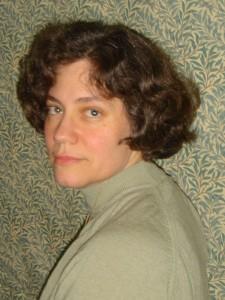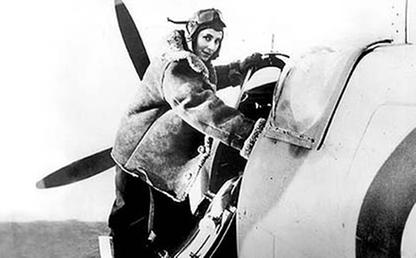 After Elizabeth Wein wrote a story called "Something Worth Doing" for the anthology Firebirds Soaring, in which a girl disguises herself as her pilot brother, her editor asked if she'd write something longer. Wein was "casting about" for ideas when she read The Guernsey Literary and Potato Peel Pie Society for her book group. "I loved the Elizabeth McKenna character," the author said. "But I thought, 'This character is too heroic. I'll never be able to live up to this ideal.' " Wein got the idea to create someone cowardly, someone who's confessing--someone who would tell the story of her friend the pilot. "The plot kept surprising me," Wein said. We're betting it will surprise readers, too.
After Elizabeth Wein wrote a story called "Something Worth Doing" for the anthology Firebirds Soaring, in which a girl disguises herself as her pilot brother, her editor asked if she'd write something longer. Wein was "casting about" for ideas when she read The Guernsey Literary and Potato Peel Pie Society for her book group. "I loved the Elizabeth McKenna character," the author said. "But I thought, 'This character is too heroic. I'll never be able to live up to this ideal.' " Wein got the idea to create someone cowardly, someone who's confessing--someone who would tell the story of her friend the pilot. "The plot kept surprising me," Wein said. We're betting it will surprise readers, too.
Do you have a particular interest in intrigue? It's also an element in your Arthurian series, begun with Winter Prince.
Definitely. The last three of my Arthurian books are spy novels. With Sunbird, the spy is actually a child, and I made that kid as young as I could, but intelligent and mature enough to do what he sets out to do. Then I thought about the consequences for the people who thought it was a good idea [to send a child out as a spy].
I'd dearly love to write a mystery novel. Plot happens around the characters I create, but I don't think I'm equipped to write a plot to begin with. With Verity, I was 150 pages in before I knew what her mission was. I didn't know why Verity was in France.
How did you find Verity's voice?
It's the voice of my own journal, my private-to-me voice. It has never been easier. It came flowing out of me.
This quote from Verity turns out to be all too true, doesn't it: "There's glory and honor in being chosen. But not much room for free will."
It's true of everyone who's involved. It depends what you're chosen for, I suppose. I'm now thinking of the other side of the war. We never get close to the concentration camps [in this book]. That's the other side. Where these people are chosen and they have no free will at all, and there's no honor and glory in it, either.

One of the things that's so admirable about your book is how no one--not even the villains--is one-dimensional. Verity writes, "People are complicated. There is so much more to everybody than you realize."
Despite the fact that von Linden's role in the book is the embodiment of evil, he has his own history, his own family, people who respect and admire him back home. Everybody has an extra layer. Some don't get enough air time.
You make us feel so hungry in that scene of Maddie, Jamie and the Lost Boys each eating an egg.
It does the same thing for me. While I was writing it, whenever I would eat a soft-boiled egg, I'd need to admire it. I try to include concrete visual, tactile sensory details that people can relate to.
Hyperion sent the manuscript out to someone from the Imperial War Museum, and one of the things he came up with--and he didn't come up with much--was that eggs were not rationed during the war, they were allocated. With allocation, you were allowed a certain number of eggs per week, whereas with rationing you could have as many eggs as you wanted as long as you had the ration coupons. In any case, I had to change it so I was using the right word. There are tiny details like this throughout the book.
Do you speak French or German?
I speak French, but very badly. My French teacher in high school, Mrs. Berman, was in the French Resistance. She was maybe 15 when the war started. She was Jewish and living in Paris. Her family was hidden in plain sight in a village in the French countryside, pretending to be Roman Catholic. She was fluent in Polish and German and French. The Resistance got hold of her and used her as a translator and, later, for delivering dynamite and such. One of our delights in French class was to distract her and get her to tell stories of her time in the Resistance. That was very influential for me, before I had any idea I'd write this book. Three years ago, I got an A-level in French. She died before I got a chance to tell her. For the French phrases in the book, I wrote my own French and got my current French teacher to check it, but for the German, I relied on friends to help me.
Peter Pan plays an important role in the book. How did that come about?
Barrie is Scottish, and lived 30 miles from where I live. The Scots really revere their literary icons. So it seemed like the sort of thing that would be on Verity's radar. Because it's very recognizable still today, the whole issue of "second to the right and straight on til morning" sort of started it off. There was an ATA pilot who was nicknamed Wendy. She was one of the few flying women. I did make it up for the book, but found that [fact] out later. The Lost Boys, that suggested itself. But the things that turned up after I'd made them up.... In one of my historic monuments magazines, there was an article about a woman who'd opened up her home to eight children in a Glasgow castle.
Back to Peter Pan. Most is in the public domain. You don't actually need permission to quote from it. The quotation I had in mind was "second star to the right and straight on til morning." The woman I contacted said, "That 'star' was put in by Disney when they made the movie in 1952. I think it does a disservice to children's imaginations, to specify it's a star." So I took the star out. She thanked me for asking permission.
There's a wonderful quote from Verity when she describes connecting with Maddie, a friendship that sustains her through all the months they're separated by the war: "It's like being in love, discovering your best friend."
It's a friendship written from the heart. I was celebrating my friendships with women when I wrote it. --Jennifer M. Brown

